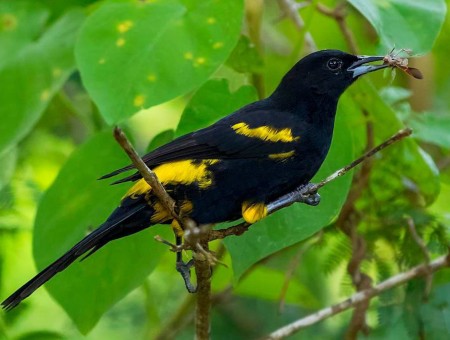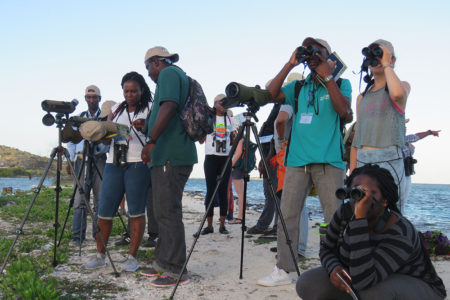
Last May, more than 30,000 people took to fields and forests around the world, noting 7,025 species in a single day—Global Big Day. A world record! In less than 2 weeks, birding’s biggest day is coming back.
On Saturday, May 4th, will you represent the Caribbean and join birders across the world as part of Global Big Day? You don’t have to commit to birding for 24 hours- just an hour or even 10 minutes of watching birds makes you part of the team. This annual event raises the profile of birds, conservation issues, and gathers a snapshot of bird distribution around the globe—and we need your help to do it!
The Caribbean Endemic Bird Festival is ongoing and incorporating Global Big Day as an activity into your events is the perfect opportunity to introduce newcomers to the joys of birding. You can practice bird identification, proper equipment use, and field skills like keeping a checklist. Visit your favorite spot or search out someplace new!
A Little Friendly Competition
In 2018, a total of 254 Caribbean birders reported an incredible 453 species on Global Big Day! Here are some of the top contenders from last year (see all the West Indies data on eBird). Will they be able to defend their titles in 2019?
Species diversity:
-
- Trinidad and Tobago: 178 species (yes, yes, we know TT is on a different level, being so close to South America)
- Puerto Rico: 136 species
- The Bahamas: 135 species
- Guadeloupe: 83 species
- Cuba: 82 species
Number of checklists (of 926 total across the region):
-
- Puerto Rico: 249 checklists
- Bahamas: 167 Checklists
- Cayman Islands: 50 checklists
- Guadeloupe: 42 checklists
- U.S. Virgin Islands: 41 checklists
In 2018, 104 of the 175 West Indian endemics were reported. Can we do better this year? If your island has endemic bird species, near endemics or endemic subspecies, make sure they are represented on the count!
Global Big Day last year also resulted in some interesting and rare birds in the Caribbean. In Barbados, a Pacific Golden Plover and a Eurasian Spoonbill were both spotted on the same day. In Antigua, a Black Kite was reported. We are curious what rarities or vagrants might show up this year!
How Do I Participate?

You don’t need to be a bird expert, you just have to go out and enjoy birds. Here’s our two-step guide:
- Watch birds on Saturday, May 4th: Can’t commit to an excursion? Even 10 minutes in your backyard will help. Global Big Day runs from midnight to midnight in your local time zone. You can report birds from anywhere in the world.
- Enter what you see and hear on eBird Caribbean: You can enter your sightings via the website or—even easier—use the free eBird Mobile app. You can enter and submit lists while you’re still out birding, and the app will even keep track of how far you’ve walked, so you can just focus on watching birds. Counts conducted at wetlands, ponds, mud flats and beaches can be entered as Caribbean Waterbird Census counts. (On a desktop when entering your data on eBird.org, on Step 2 “Date and Effort” page, be sure to choose either the “CWC Point Count” “CWC Traveling Count” or “CWC Area Search” observation type. If you are using the EBird Mobile app – adjust your settings – choose eBird Caribbean as your portal and these options will show up!)
Global Big Day Tips:
- If you’re looking for a new place to find birds, explore eBird Hotspots near you.
- Use Merlin Bird ID for help with tricky species.
- Get together with friends and set a goal for your birding—most unusual species? biggest flock? all the species in your favorite family? The possibilities are endless.
- Take photos and add them to your checklist—they might end up on the Global Big Day page!
- Make your sightings more valuable: submit complete checklists, keep counts of the birds that you see, and keep multiple checklists throughout the course of your birding—if you get in the car, end that checklist and start a new one when you get to the next location.
- Share what you’re seeing on social media with #globalbigday! Add your planned May 4th location to the global map.
Last year’s Global Big Day was record-breaking in terms of effort and species reported. On May 4th, we hope you will join us for the word’s next birding record!
